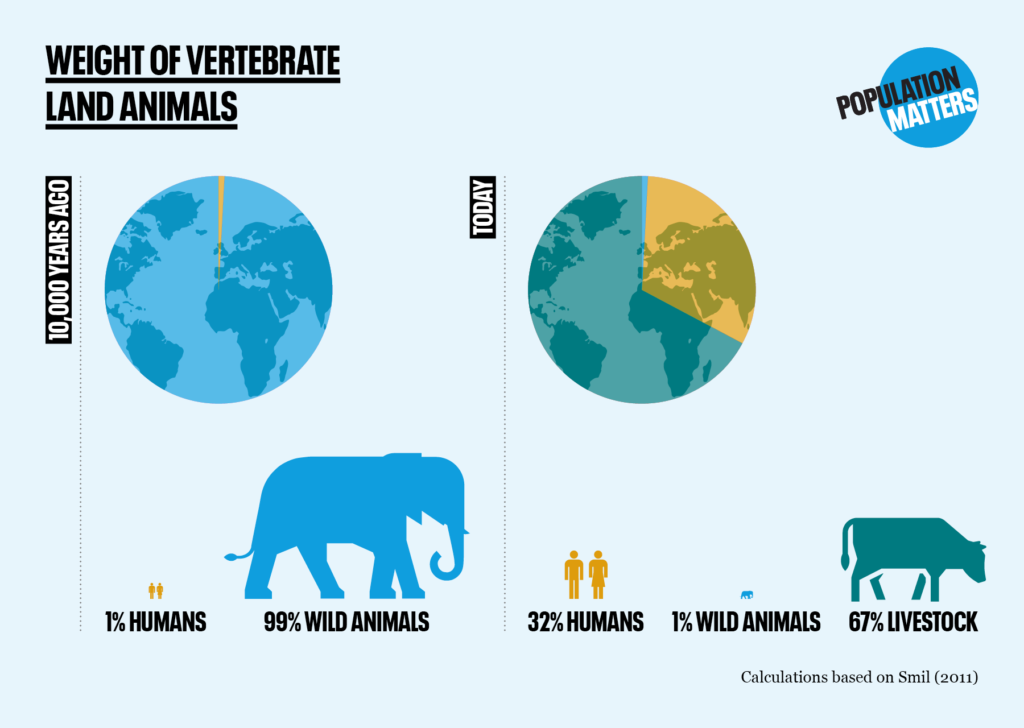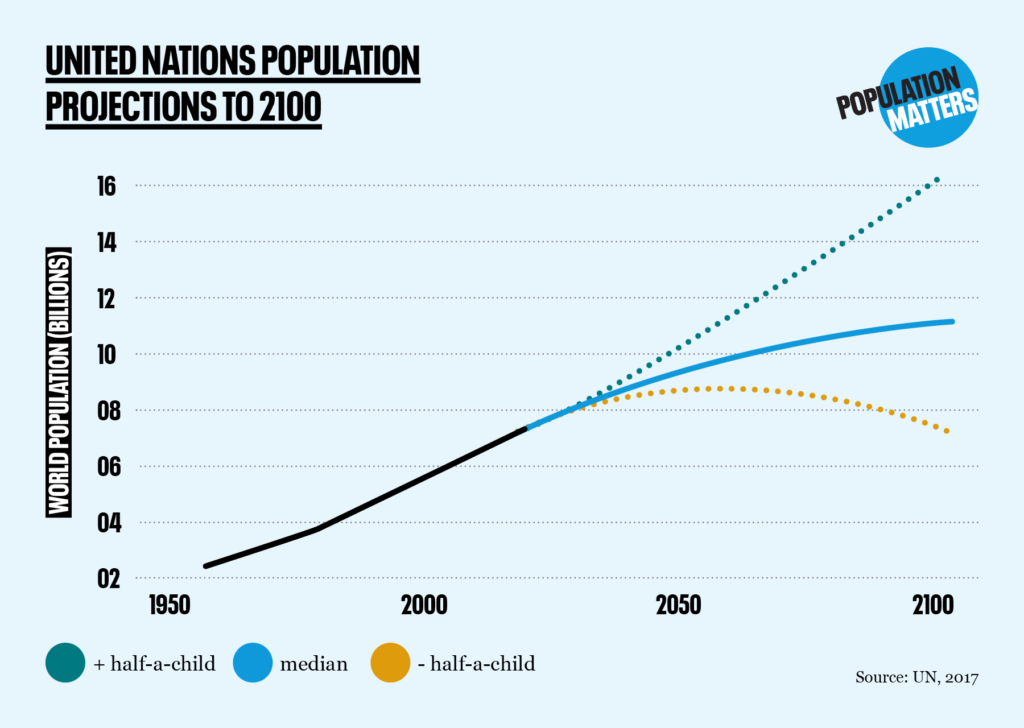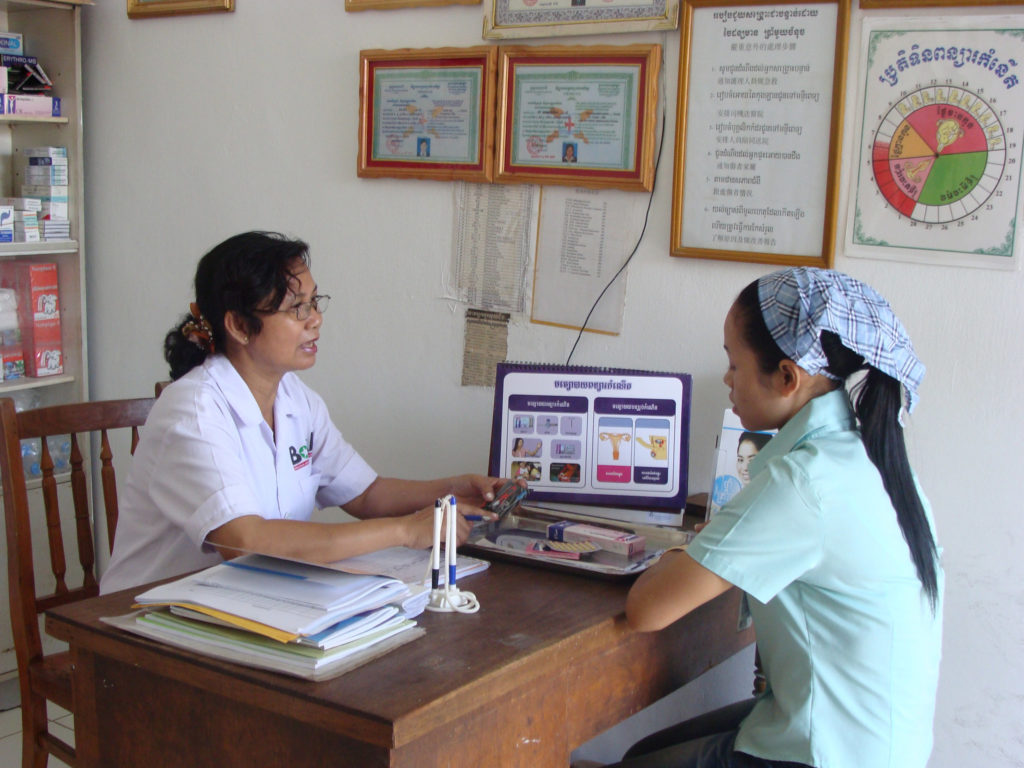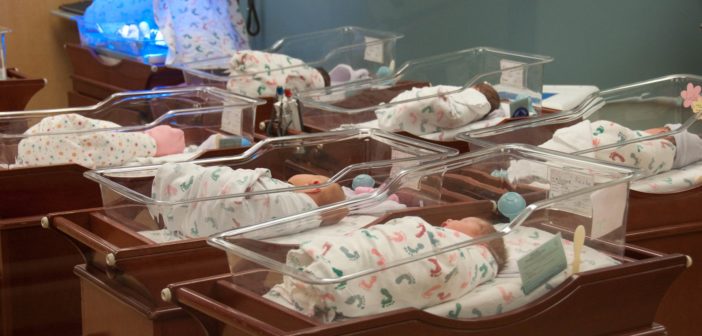For many the march of social justice points naturally towards animal rights. If the history of that march meant including vulnerable beings, oppressed because of their race, gender, sexual orientation, and otherwise, it must also include the most oppressed, and numerous, of beings. And for many that inclusion is happening through the rise of veganism, or boycotting industries that use animals. We help animals by not consuming them.
Is that true? Of course – but it’s not the only game in town. Consumer-based veganism is essential, but we need veganism and animal rights to include a focus on human population and family planning if we ultimately want those movements to truly address the threats animals face.
Since the modern advent of animal rights the number of animals driven into extinction, tortured and killed for food or fur, used in horrific experiments, bred in puppy mills, and exploited and harmed in every imaginable way has exploded. Supply follows demand, demand follows population growth, and between 1804 and today human population has grown from one billion people to nearly eight billion people. Our proliferation has multiplied animal suffering and death exponentially. A tidal wave of people has washed over the world of animals – a wave too large for our human brains to really comprehend and respond to in the way we respond to the immediacy of animals in shelters, for instance.

Ballooning human population has been the primary cause of animal suffering, and while our growth rate is slowing, the UN projects just a one in four chance of it stopping before the end of this century. Whatever other progress we achieve, adding another two billion people by 2050 – as the United Nations currently projects – will continue to hold back, and even nullify, the benefits of dietary and other behavior changes. Without an almost unimaginable transformation in global diets, the sheer number of humans will inevitably mean greater demand for animal products and greater intensification of animal agriculture, with human population growth providing another excuse to justify those evils. More humans also means greater pressure on habitats and further climate change, with all the destruction to animals that entails.
The torture, suffering, death and extinction of animals are all inextricably linked to human population. Animal rights is founded on a vision of a more empathetic population of humans living in coexistence with liberated nonhumans. Essential to that vision is also a smaller population of human beings, redressing the imbalance between our impact and theirs. What else would animal liberation look like? Taking into account the reality of how our species interacts with others means incorporating ethical population action and family planning reform, and fixing the systems that are currently wiping out animals and the ecosystems they and humans both rely upon. Had the animal protection movement embraced better family planning as a goal decades ago, many more animals could undoubtedly have been saved. Moreover, given that working to maximize biodiversity in the first place would have provided the most effective foundation for protecting humans, environmentalists today probably wish they had done the same. It’s not too late; these goals can be implemented now.

The Good News
First, population and fertility rates are much more malleable than things like diet, or other forms of consumption. Average family sizes around the world have dropped steeply over the past several decades thanks to intentional interventions, improved reproductive technologies, the empowerment of women and the alleviation of poverty. That evidence suggests we may be able to change family planning and population projections more effectively than we can change how the average person uses animals in a society predicated on animal exploitation.
Better family planning is a win-win for parents, kids, our communities, and the environment. We can accelerate family size reduction towards sustainable, human-rights based targets, as opposed to the unsustainable constant economic growth model behind the “underpopulation” propaganda pushed through news cycles today. This is achievable through targeted interventions, like getting the male birth control pill and other new prophylactics to market, with funding for broad and community-led interventions. By the year 2100, world population could vary by billions of people, depending on how many children the average woman in the world today has in her lifetime. Given that access to truly human rights-based family planning is arguably the most fundamental human right of all, there are compelling reasons for focusing our attention on implementing it, through many effective means. Providing the freedom and desire to make that choice to families and communities across the world is our mission; we can have the biggest impact by far for nonhumans and humans alike by acting today.

Second, those reforms and interventions — which again are potentially massively more beneficial to domesticated and wild animals than simply changing how we consume — are truly fundamental and intersectional. Humans benefit from better family planning and an ethic of smaller families in ways that tie the animal rights movement to other social movements that seek to improve child welfare, economic equity, and human rights and democracy. Population is not some exogenous issue we work on. We are the product of family planning policies of the past, and the people who make up the animal protection movement of the future will be the product of family planning policies of today. We can help to create more empathetic and responsible individuals through empowering people to make better family planning choices.
Population means people, and people are the determining factor in the formation of social justice movements. Moreover, we are members of a democracy before we are consumers in an economy, and the former thrives on smaller populations of highly empathetic and engaged people, not just creating more economic inputs. Better family planning strengthens democracy. Smaller families mean higher investments in each child and better overall outcomes across a wide swath of social issues, using objective measures like international sustainable development goals.
Better family planning and sustainable population improve the lives of people in innumerable ways, and can be achieved through positive, consensual actions that empower people and provide them with greater choice and opportunity. Population-focused veganism is the natural continuation of anti-colonization movements through decolonization of biodiverse habitats of the nonhuman world. This is a win-win for humans and animals.
Aspirational laws aside, in the real world animals’ fate depends on the quantity and quality (in terms of the early childhood development of empathy) of people with whom they share the world. If animals were legislators they would certainly focus on family planning reform, and slowing the tidal wave of humans overtaking their world.

Taking action
Animal rights advocates can help to promote understanding of the problem and the solutions, within the animal rights community but also beyond. Positive actions to address population are not yet part of mainstream environmental discourse. Animal advocates made the case for plant-based diets on environmental grounds for decades before large environmental groups and policymakers started adopting these ideas. Our planetary crisis is worse because of that delay: we cannot afford the same inertia on population. We must now accelerate and normalize the discussion of population. That means informing ourselves, recognizing the obstacles and anticipating the objections, and using our individual networks and communities to engage environmental decision-makers and influencers, and move as quickly as possible from discussion to acceptance to positive action. One easy way for animal rights and environmental groups to incorporate sustainable family planning in their work is to join the call for the UN to change its approach.
Sustainable population and family planning organizations are directly engaged in positive actions to support the natural world. Visit the websites of Having Kids and Population Matters to learn about actions you can take on issues such as biodiversity and the Sustainable Development Goals. If you’re considering having a family, you can learn more about the benefits of smaller families or being child free.
Featured image: babies in a hospital nursery. Image credit Dave Herholz, CC BY-SA 2.0.






2 Comments
Thank you for addressing the most pressing animal-rights issue that gets marginalized in all the environmental, climate change, and human rights discussions. I have always said: humans are the consumer species. We devour all the animals (none are spared), take 99.9999% of the planet’s resources, and generate tons of garbage. Humans not only increase their populations, but also “human needs” are rising beyond barriers!
I’m for birth control, including access to abortion, and I’m a child-free woman. All of this goes against the teachings of the Catholic Church, which pushes for more babies, more families, no birth control, no abortion. You be the judge…..
A Vatican spokesman said the criticism [regarding the film “Avatar”] reflected Pope Benedict XVI’s view that environmentalists should be careful to avoid “neo-paganism.” While the so-called green pope has declared environmental offenses a sin, he has also warned against “considering [nature] more important than the human person.”
Vatican Radio also attacked the movie, saying that it encouraged “all those pseudo-doctrines that turn ecology into the religion of the millennium.” It claimed that in the film, “nature is no longer a creation to defend but a divinity to worship.” In his New Year’s Day message for World Peace, Pope Benedict criticized the tendency to consider Nature as more important than the human person, and the “egalitarian vision of the “dignity” of all living creatures.” “Such notions … end up abolishing the distinctiveness and superior role of human beings. They also open the way to a new pantheism tinged with neo-paganism, which would see the source of man’s salvation in nature alone, understood in purely naturalistic terms.” What is missing is a realization of how the Christian tradition has fostered this culture of domination and condemned nature mysticism as sinful or subversive [but not the cult of idolatry of the “human person” over Nature].
Two thoughts
How many children in a family constitutes a ‘large’ or ‘small’ family?
‘There is enough for every one’s need but not for everyone’s greed.’ Mahatma Gandhi